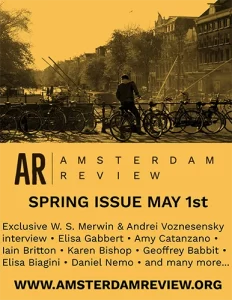Mantis – Summer 2009
Issue 8
Summer 2009
Annual
Sima Rabinowitz
Mantis editor Bronwen Tate describes the issue’s contents as “exciting” in her Editor’s Note. An understatement if I have ever read one. The journal is, in fact, exhilarating, captivating, inspiring, and highly original. In addition to new poems from Clayton Eshelman, Adam Clay, Sina Queyras, and Gretchen E. Henderson, this issue features translations – in discrete, handsomely collected groupings, all beautifully translated – of the work of Italian poet Alda Merini, German poet Veronka Reichl, and poet Andrei Sen-Senkov (originally from Tajikistan, now a resident of Moscow), and a special section “Remembering Celan”; a fascinating series of 10 interviews by Elizabeth Bradfield and Kate Schapira “Temporarily at Home: Poets on Travel and Writing”; and smart reviews of books I might not know had been published, were it not for Mantis. The magazine is produced with a kind of subtle elegance and graphic flair seldom encountered and is impressive and polished from the selection of contents to their careful and appealing presentation.
Mantis editor Bronwen Tate describes the issue’s contents as “exciting” in her Editor’s Note. An understatement if I have ever read one. The journal is, in fact, exhilarating, captivating, inspiring, and highly original. In addition to new poems from Clayton Eshelman, Adam Clay, Sina Queyras, and Gretchen E. Henderson, this issue features translations – in discrete, handsomely collected groupings, all beautifully translated – of the work of Italian poet Alda Merini, German poet Veronka Reichl, and poet Andrei Sen-Senkov (originally from Tajikistan, now a resident of Moscow), and a special section “Remembering Celan”; a fascinating series of 10 interviews by Elizabeth Bradfield and Kate Schapira “Temporarily at Home: Poets on Travel and Writing”; and smart reviews of books I might not know had been published, were it not for Mantis. The magazine is produced with a kind of subtle elegance and graphic flair seldom encountered and is impressive and polished from the selection of contents to their careful and appealing presentation.
The poems in translation are simply stunning. Merini’s “Poesie per Marilyn” (Monroe) turns what might be kitsch into lyric bliss (“Domani se l’amore ni tradisse / prendero un’ape azzurra / che mi morda la boca”or “Tomorrow should love betray me / I will catch a blue bee / and let it sting my mouth”). Sen-Senkov, also inspired by Hollywood, is a master (like the journal’s editor) of understatement: “the boy, before the bomb explodes, / has just enough time to pet the dog.” Veronika Reichl’s “33 Functioning Machines” are provocative prose poems, all small portraits of women: “Luisa muss durch den Mond, also durch einen ‘der,’ einen Mann, ihren Mann, verdrängt werden, oder augehoben; zumindest verdeckt werden.” “Luisa must be displaced by the moon, that is to say be a ‘he,’ a man, her man; or annihilated; at the very least occluded.”
I loved the nearly hundred pages of interviews with traveling poets/poets who travel, which include writers who wander with the support of travel grants and awards and poets who’ve strayed from home as a result of non-writing-related reasons (family, jobs, education, etc.). Interviews are preceded by brief notes about where the poet traveled and when, where they reside permanently, other homes where they have lived, their birth city, or other relevant information. What makes these interviews all the more interesting is that none are with poets most readers of the journal are likely to know as among the poetry industry’s household names, but all are interesting, intelligent, and worth hearing from. The interviews contain excerpts of the poets’ work and smart pull quotes (which I don’t usually appreciate in literary journals, but which work beautifully here and are tastefully presented).
In his “Poem to Help Will Alexander Fight Cancer,” one of three from Anticline featured in the new poems section, Clay Eshelman writes: “We must ask the poem for the impossible, locate / ourselves within this asking.” I think Mantis has asked the impossible – and delivered the truly amazing – in more ways than I can begin to describe in this brief review.
[http://mantisjournal.stanford.edu]




